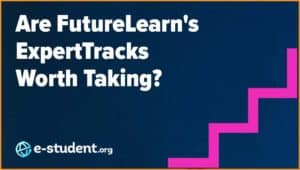
Are FutureLearn’s ExpertTracks Worth Taking?
This is our review of FutureLearn’s new ExpertTrack programs. Are they really as cost-effective as they seem?
Explore Meta's Front-End Developer Certificate on Coursera. Our review helps you decide if it's the right investment for your web development career
E-student.org is supported by our community of learners. When you visit links on our site, we may earn an affiliate commission.
4.7 / 5
The Meta Front-End Developer Professional Certificate on Coursera is an excellent option for aspiring individuals who want to become skilled front-end developers. Designed to be completed in about 7 months, it offers a thorough learning experience with a well-structured curriculum, practical exercises, and interesting capstone projects. Teaching you how to work with industry-standard tools like Bootstrap, React, and Figma, this course equips people with the skills to take on junior roles in front-end improvement, creating interactive web pages and professional page layouts. Overall, this course is highly recommended for anybody seeking a successful career in front-end development.
So you’ve designed your killer app that revolutionizes data management, but how can it actually become a useful tool that anyone can use? This is where Front-End Developers come in, designing app and web interfaces to be accessible and intuitive. With HTML, CSS, Javascript, and more, combined with UX design chops, they help shape the user’s experience that can make or break a new product.
With this in mind, the recent addition of Meta’s Front-End Developer Professional Certificate is a very welcome addition, given their other highly appreciated certificate courses on Coursera. Even if there have been a few good comprehensive options around for getting an introduction to front-end development, if this has a similar standard, it could provide a better way for those wanting to make a career in this domain.
In this review, we’ll take an in-depth look at what the program has to offer, including a detailed review of its component courses, to evaluate whether it might be a good fit for you.

The Coursera-hosted Meta Front-End Developer Professional Certificate is a comprehensive program designed to provide you with the key skills and knowledge required to take on an entry-level position and set up for a career in front-end web development. This seven-month program focuses on the fundamental technologies of front-end programming, such as HTML, CSS, and UI/UX frameworks, and takes you through the full role of a front-end developer, from understanding the fundamental building elements of web pages to developing dynamic user experiences. You should be able to build effective, responsive, and visually appealing web apps at the conclusion of the course.
Developed in cooperation between Meta and Coursera and drawing on the expertise of Meta’s staff developers, it is designed to provide you with practical and hands-on experience in front-end programming and web development. The program is suitable for both new developers and those with some experience trying to improve their skills. Through video lessons, supplementary resources, labs, and capstone projects, you’ll get started with HTML and CSS for structuring and designing content, continuing with JavaScript, as well as the Bootstrap framework, before entering the world of React, a widely used JavaScript library created at Meta. Overall, the Meta Front-End Developer Professional Certificate promises to be a user-friendly solution for beginners and professionals looking to start a career in front-end development.
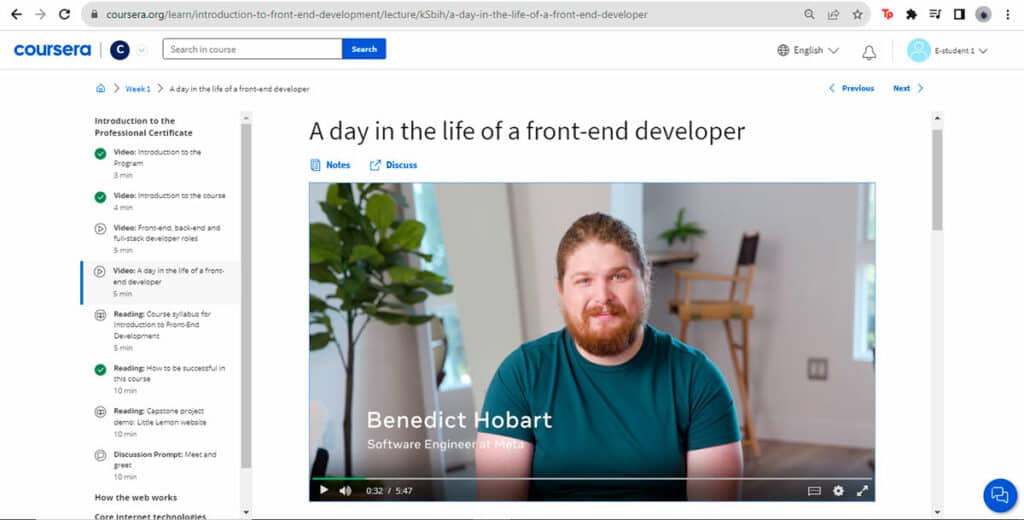
The Meta Front End Developer Professional Certificate is designed for beginners who have a keen interest in web development. It requires no previous experience in web development, making it accessible to learners with limited experience but a willingness to dive into coding. This program serves as an excellent starting point for those who want a career in web development. With a structured curriculum and hands-on exercises, it provides the necessary foundation for users to grasp the basics of front-end development and advance their expertise in creating user-friendly and visually appealing websites.
The program is structured to give foundational knowledge and hands-on practice, assuring that you grasp vital concepts. Whether you are a total beginner or have some fundamental familiarity with web technologies, this course offers a probative learning environment to start your career as a complete front-end developer.
This Professional Certificate is included in the Coursera Plus subscription, which costs $59 monthly. This subscription also includes 7000+ courses, hands-on projects, and job-ready certificates. This Professional Certificate is estimated to be completed in seven months, which would add up to $413. If planning to complete it at this pace, I would recommend instead an annual Coursera Plus subscription, which costs $399.
Another option is to purchase only this certificate, which would cost you $49 per month and $343 in total for seven months. Since the price is more or less the same, I recommend the Coursera Plus subscription, as you can gain access to multiple certificates and other courses.
But note that since the courses on Coursera are flexible, you can always complete the course quicker than three months and pay a lesser amount. And there is always the option to audit the courses to get much of the course content for free.

This certificate program consists of nine courses. Each course is structured with weekly studies in mind, with each week concluding with a graded assignment. However, the tempo is flexible, and you can complete the course in less or more time, as you prefer.
The framework of each course is the same, with an introduction to the course, overview, videos, readings, practice quizzes, and graded assignments at the end. The majority of the course content is covered by videos, but each video is brief and only covers a certain area of the course. Throughout the program, you will complete supplementary lectures, hands-on exercises, quizzes, and assessments to bolster your understanding and boost practical experience in front-end development.
The labs are done in a separate virtual environment, like Vs Code. You access them from Coursera, and it redirects you to the lab environment, giving you practical experience with the workspaces and web development environments.
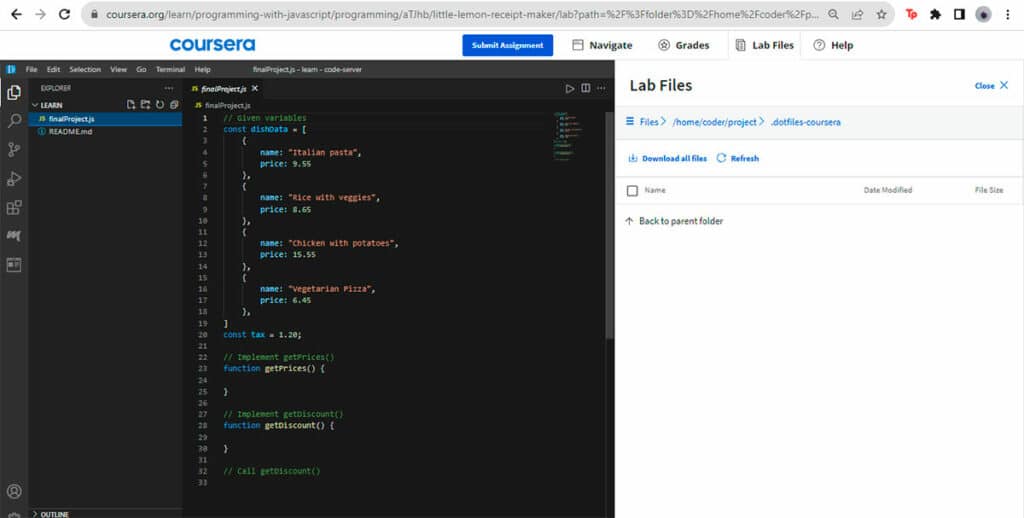
Some courses also include peer-graded assignments, where you get feedback from other students. Additionally, you have the chance to assess and critique other people’s work. It is a useful exercise to learn from the work of others and to use your knowledge to support their learning. It also encourages a more social learning environment where you can engage with classmates and feel a sense of belonging. Typically, the peer-graded assignments account for 10% of the overall grade.

The Introduction to Front-End Development course lays a firm foundation by giving you a basic understanding of the essential technologies driving the internet. It equips you with a working knowledge of important web development tools like HTML and CSS while constantly encouraging you to put your knowledge into action.

At each step of the way, from introductory basics to more complex concepts, you are presented with openings to test your knowledge, solidifying your understanding and skill set. The course is nicely structured and specifically designed to nurture the capability to produce engaging and interactive user interfaces. The course’s practical exercises and methodical approach serve as a solid foundation for the later courses that build on its knowledge.
This course provides students with the basic knowledge needed to use JavaScript. The course includes hands-on labs and ends with a final exercise project that will help you put what you’ve learned into practice. After finishing this course, you will be able to create simple JavaScript code, manipulate objects and arrays, and write unit tests using Jest.
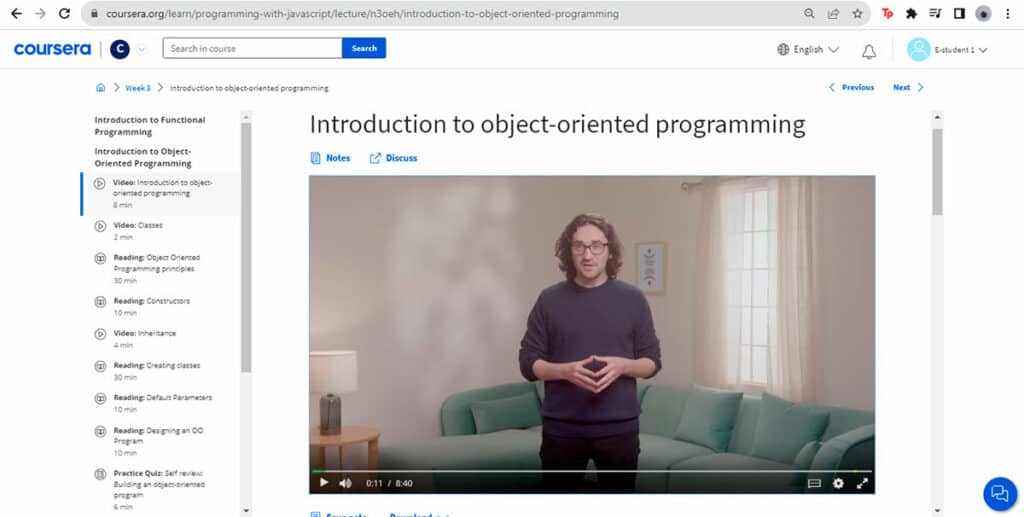
The course covers core JavaScript topics such as functions, objects, arrays, variables, data types, and manipulation of HTML. The course also teaches you to write unit tests using the popular testing frame Jest.
This course provides students with the basic knowledge of how modern software developers collaborate across the world without messing up each other’s code. This course will teach you how to implement version control systems, navigate and configure using the command line, use and create a GitHub repository, and manage code revisions. The course also teaches how Git can be used to manage team files in software development projects. As part of the exercises, you will also then create a repository that can manage code revisions.

The course on version control is an important resource for modern software developers, as it helps you gain comprehensive knowledge through version control systems, acquiring skills that are necessary for front-end development. You’ll also get more familiarity with the command line. Through a series of engaging modules, you’ll be introduced to essential Linux commands, being able to cut, produce, brand, and manage lines with ease.
Building on the introductory course, the “HTML and CSS in depth” course goes into further detail on these two languages to help build attractive web pages. This course teaches you to create forms with a responsive layout, create user interfaces using Bootstrap, and implement debugging tools.
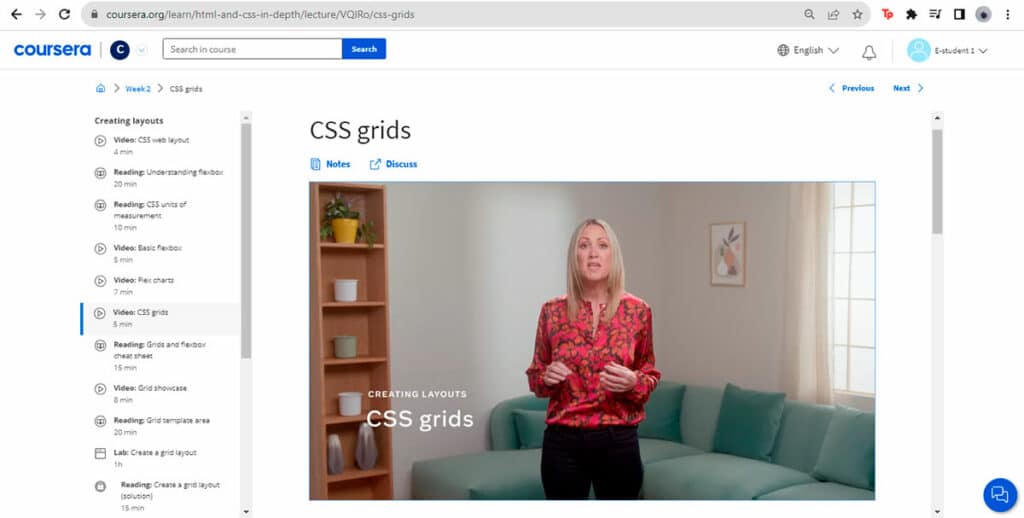
The course teaches you to employ the power of HTML to construct visually appealing web pages, concentrating on structured semantic data to optimize end-user experience on the webpage. As you progress, you’ll delve deeper into CSS, applying increasingly complex styles, assuring that web content isn’t only functional but visually fascinating. The course also introduces Bootstrap, preparing you with the skills to produce responsive user interfaces with ease.
In this course, you’ll explore the basic concepts of the React library and learn the basic skills needed to build an app. This course enables you to organize React projects and create web pages and apps in React.

This course provides an excellent foundation for individuals seeking to harness the power of React, a versatile JavaScript library for building dynamic user interfaces in web and mobile applications. It explores the core concepts underpinning React, teaching you to create robust, scalable, and interactive web applications. It offers a comprehensive introduction to React, enabling you to build dynamic user interfaces for engaging web and mobile applications.
You’ll gain proficiency in using reusable components to render evolving data views, enhancing user experience. You will also learn to organize projects for optimal scalability and maintainability, a critical skill in modern web development. You will gain hands-on experience using React.js, JSX, and other key tools to prepare for a career in mobile development.
In this course, you will explore different types of React components and their features and how to use them. This course will enable you to test React applications, interact with a remote server, and integrate commonly used React libraries.

The curriculum covers a wide array of topics, from efficiently representing list and form components to using React Context for global state management. You will gain skills in retrieving data from remote servers and using advanced hooks in React. This course also covers component configuration techniques, advanced patterns for encapsulating common behaviors, and testing React components.
In this course, you’ll learn the fundamentals of User Experience (UX) research and design. It will immerse you in the process of identifying problems and testing and iterating designs to find appropriate solutions.
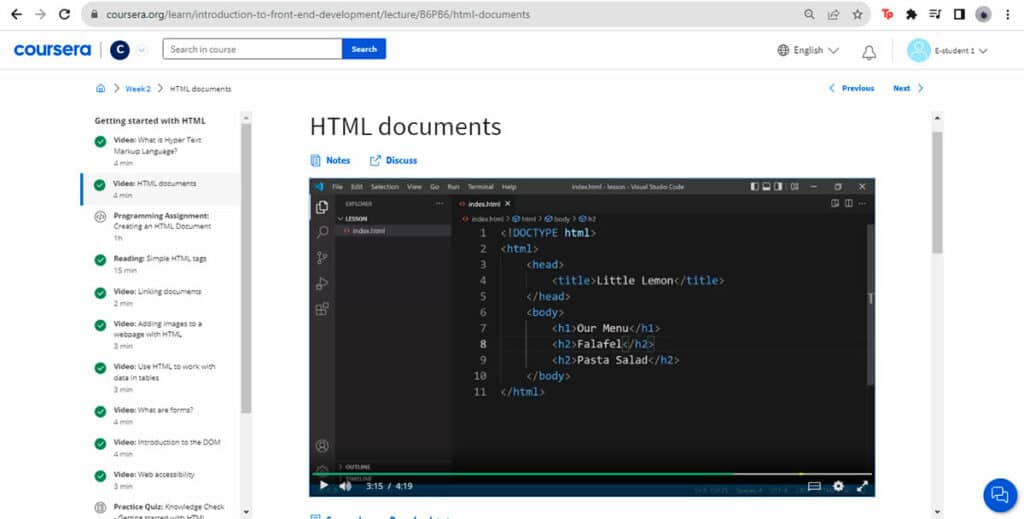
The course emphasizes user empathy through exploration, allowing students to prepare user personas and produce good design opinions. Likewise, the course introduces the User Interface (UI) design process, tutoring you on how to elaborate wireframes and prototypes using Figma. It also imparts core design principles similar to hierarchy and grid operation. By the end of the course, you will design digital products that give value and solve users’ problems meaningfully. You will also be able to assess interfaces for design quality, creating, participating in, and testing UX/ UI designs while following assiduity guidelines.
Capstone projects for Coursera Professional Certificates are designed to allow you to demonstrate multiple skills based on your certificate by solving authentic, real-world problems. This course enables you to design and style a responsive User Interface (UI), demonstrate bug-free coding, and use React components.

This course is designed for intermediate-level learners aiming to elevate their skills in front-end web development. It emphasizes clean and error-free coding practices while utilizing React components to create multiple views. You will delve into building a website’s front end using React JS and JavaScript.
This is the last course of the Meta Front-end Developer Professional Certificate. In this course, you will learn to prepare yourself for the different aspects of a coding job interview. This course is an essential program for individuals aspiring to excel in technical job interviews. With a focus on problem-solving and foundational computer science principles, this course equips you with the skills necessary to tackle coding interviews effectively.
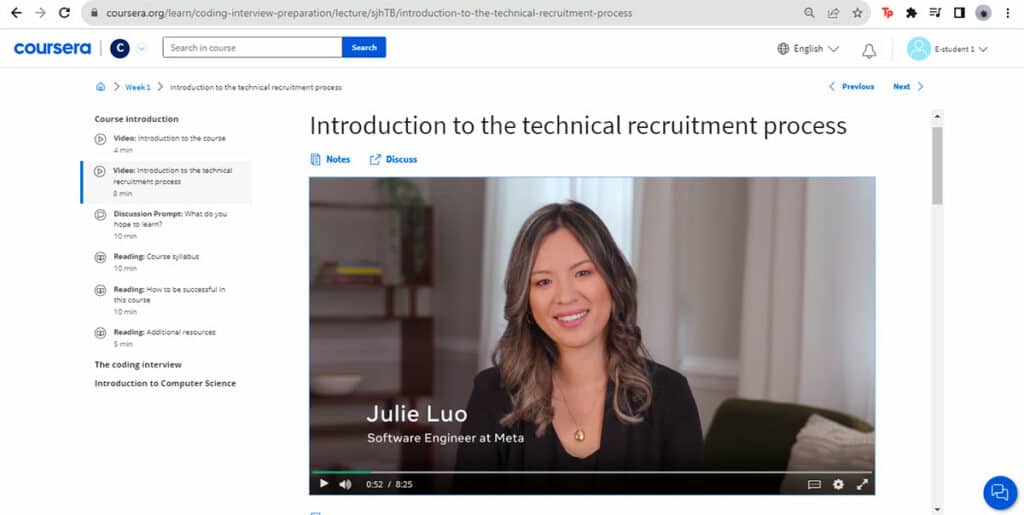
The Meta Front-End Developer Professional Certificate offered through Coursera has garnered positive feedback from learners. Many participants have praised the program for its comprehensive coverage of front-end development topics, including HTML, CSS, UI frameworks like Bootstrap and React, and other essential technologies. They found the hands-on approach, which allows learners to practice their skills throughout the course, to be highly effective.
Additionally, the certificate program’s structure, coupled with the guidance from experienced instructors, has been commended for providing a strong foundation in front-end development. Overall, students have expressed satisfaction with the knowledge and skills gained through this certificate, making it a worthwhile choice for those aspiring to excel in the field of front-end development.
In addition to the Meta Front-End Developer Professional Certificate, you have various alternatives and complementary courses available to further enhance your expertise in web development. One notable alternative is edX’s Front-End Developer Professional Certificate offered by W3Cx. Though more expensive, the program furnishes a comprehensive and step-by-step approach to mastering the three foundational languages of web development – HTML5, JavaScript, and CSS.
To round up your literacy, you can consider enrolling in courses that concentrate specifically on UI/ UX design principles. Understanding user interface and user experience design is pivotal for creating user-friendly websites and operations. Also, diving into advanced JavaScript libraries and frameworks like Angular, Vue.js, or Node.js can boost one’s knowledge and open up new openings in full-stack development. Each platform may have its own unique features and course offerings, so it is worth exploring all options to find the best fit for your learning goals.
In conclusion, the Meta Front-End Developer Professional Certificate provides a well-rounded and hands-on learning experience in front-end development. Covering key aspects like HTML, CSS, UI structures, and web development fundamentals, this program equips you with the knowledge and expertise demanded to excel in the field. The practical approach, combined with high-quality material delivered by the instructors, ensures that participants gain firm control of necessary technologies.
One of the crucial strengths of this program is its accessibility. It’s an excellent starting point for those with little or no previous experience in web development. Also, the course is structured with flexibility in mind, allowing students to learn at their own pace and on their own schedule.


This is our review of FutureLearn’s new ExpertTrack programs. Are they really as cost-effective as they seem?

Dive into the world of artisanal bread baking with Apollonia Poilâne, CEO of Poilâne, arguably the most famous bakery in France. In this MasterClass, she shares the secrets behind making the perfect sourdough, wheat, and brioche bread. But can mastering the art of bread baking truly be achieved online? Let’s find out!
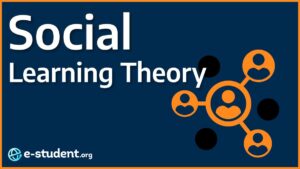
The Social Learning Theory can help teachers understand student behavior and guide them in developing valuable skills and habits.